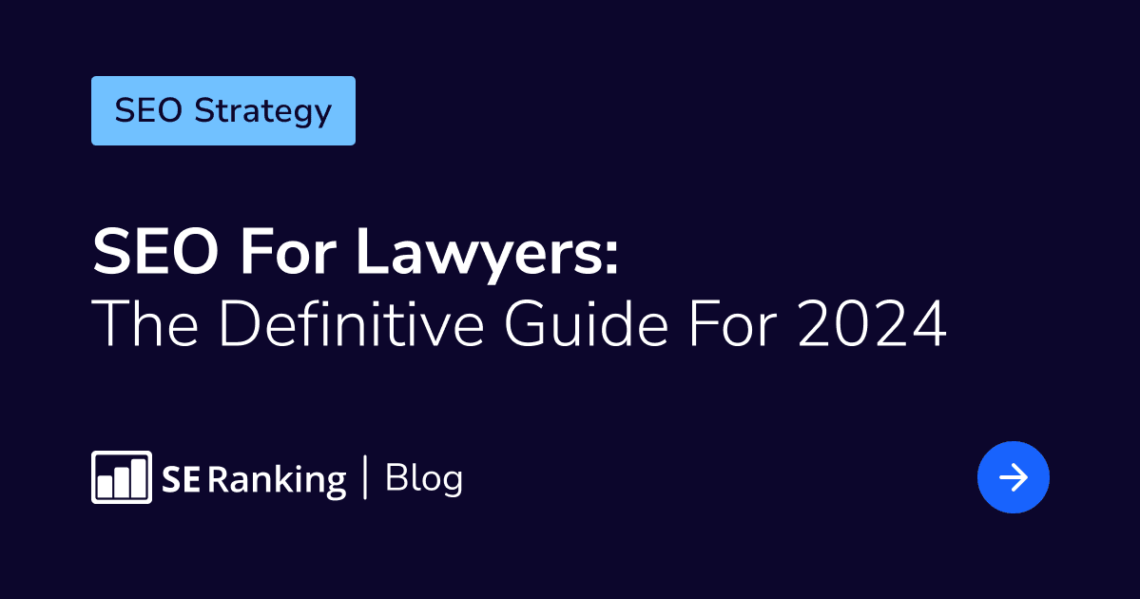- What is lawyer SEO?
- Why do lawyers need SEO?
- How to do SEO for lawyers?
- Keyword and competitor research
- Content and on-page SEO
- Local SEO
- Technical SEO & accessibility
- Off-page SEO
- Digital PR campaigns
- HARO backlinks
- Guest blogging
- Social media marketing
- Strategies to implement SEO for lawyers
- Option #1: Hire a law firm SEO expert
- Option #2: Do SEO yourself
- Conclusion
Want to understand SEO concepts like indexing, search intent, and on-page optimization just as well as complex legal terms?
If so, you’re in the right place.
Today, SEO plays an essential role for businesses with an online presence, and lawyers are no exception. The higher you rank on search engine result pages (SERPs), the easier it is for clients to find you online.
This article explores the specific features of SEO for law firms, explains its significance, and teaches you how to build and implement an SEO strategy for your legal business.
Let’s get started!
What is lawyer SEO?
Lawyer SEO (search engine optimization), also known as legal SEO or attorney SEO, is the practice of improving a law firm’s presence online to achieve high positions on search engine results. This puts your firm front and center of prospects whenever they search for lawyers on Google or Bing. It’s an overall win-win: you get a continuous flow of high-quality leads, and users find the perfect legal fit for their needs.
Why do lawyers need SEO?
While each marketing channel has its pros and cons within different niches, SEO stands out as one of the most effective methods for attracting potential clients seeking legal services.
Let’s use an example to illustrate why.
PPC or paid advertising, an alternative channel, has some of the most expensive clicks for law-related keywords and phrases. HawkSem, a digital marketing agency, states that “the average firm or attorney that invests in PPC marketing for lawyers spends around $9,000–$10,000 a month.” The price point is rather high, and once you stop investing money, your ads no longer appear in paid search results for your target keywords.
SEO presents a more sustainable and cost-effective approach to promoting your business online. It can help you:
1. Attract more qualified leads.
By ranking higher in search engine results for relevant legal terms and queries, law firms can increase their visibility and attract more potential clients actively searching for their services online.
2. Establish authority and trust.
Having high search engine rankings and a strong online presence helps law firms establish themselves as authoritative and trustworthy sources in the industry. This can be particularly important in the legal field, where potential clients often prioritize expertise and reputation when selecting a lawyer or law firm.
3. Improve local search visibility.
For law firms targeting specific geographic areas, optimizing for local search is crucial. By ranking well in local search results, firms can increase their visibility and attract more clients in their immediate vicinity.
So, unlike PPC campaigns, which require continual investment of time and money, the benefits of SEO can compound over time. While both channels are useful for attracting traffic, neglecting SEO will leave you missing out on a massive source of free, qualified traffic.
How to do SEO for lawyers?
The main SEO principles apply consistently across different industries. Yet, there are some unique considerations that people operating within the legal field should take into account in advance.
Legal SEO involves more than targeting relevant keywords. Since legal matters significantly impact people’s lives (think “Your Money or Your Life” topics for Google), showing users that you’re a law expert becomes exceedingly important. Google’s Search Quality Guidelines recommend showcasing Expertise, Experience, Authoritativeness, and Trustworthiness (also known as E-E-A-T criteria) on your website to establish yourself as a reliable legal resource.
Now, let’s go through the process of doing SEO for lawyers in more detail.
Keyword and competitor research
Identifying relevant keywords and keyword clusters is foundational to building a successful SEO strategy. This is especially true for attorney SEO marketing. When building your SEO strategy, start by researching (and then targeting) terms related to your area of expertise, and your firm’s specializations and locations. Think about common legal queries that potential clients might use when searching for legal services online.
For example, if you are a lawyer providing legal services in San Diego, your keyword list might include queries like:
- San Diego attorney
- San Diego lawyer
- law firm San Diego
But these are broad and generic terms. Not only do they not target your specific area of expertise, but they are also highly competitive.
It’s better to target more specific queries, especially those that reveal your specialization, like:
- San Diego injury attorney
- San Diego divorce lawyer
To maximize your chances of appearing at the top of the SERP and attracting the right clients, optimize for long-tail keywords with low search volume. These are longer, more specific keywords that usually have fewer monthly searches compared to more popular keywords. At the same time, they are less competitive and offer a higher chance of conversion.
To illustrate this point, here are a few high-search-volume keywords and their low-search-volume alternatives:
- child custody lawyer vs child custody lawyer for same-، couples in Dallas
- car accident lawyer vs top-rated car accident lawyer near me
- real estate law firm vs real estate law firm for first-time homebuyers in Denver
To identify these keyword opportunities, you can use a dedicated tool like SE Ranking’s Keyword Suggestion Tool. It provides keyword ideas and shows the potential traffic you can get using particular keywords within your content. It also shows you how difficult it would be to rank for them.
Here’s a list of low search volume keywords worth considering based on the focus keyword “San Diego attorney”:
- birth-injury attorneys San Diego
- bankruptcy attorneys in North San Diego County
- best-rated accident attorneys in San Diego
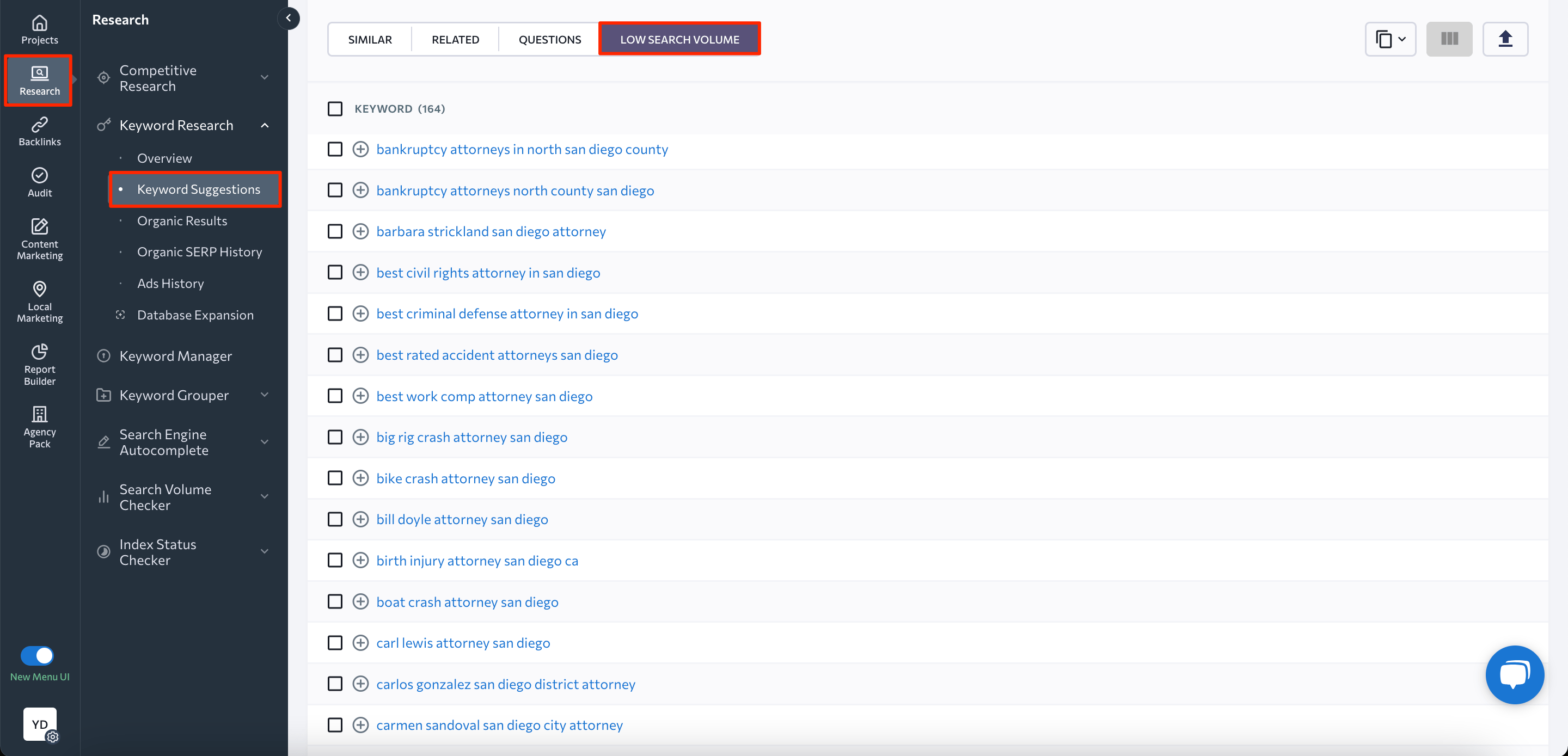

When performing keyword research, analyze your competitors’ top-ranking pages and targeted keywords. This helps you understand how they attract organic traffic and which keyword strategies work best for them. By targeting some of their keywords within your own content, you may be able to “steal” a portion of their traffic.
To identify your direct and partial competitors and collect data on their targeted keywords and estimated total traffic, you can use SE Ranking’s Competitive Research Tool. Within the Organic Traffic Research tab, you’ll find a detailed list of your competitor’s webpages along with essential metrics like traffic share, keyword count, etc. Filter the pages by total traffic to see the most popular pages on their website.
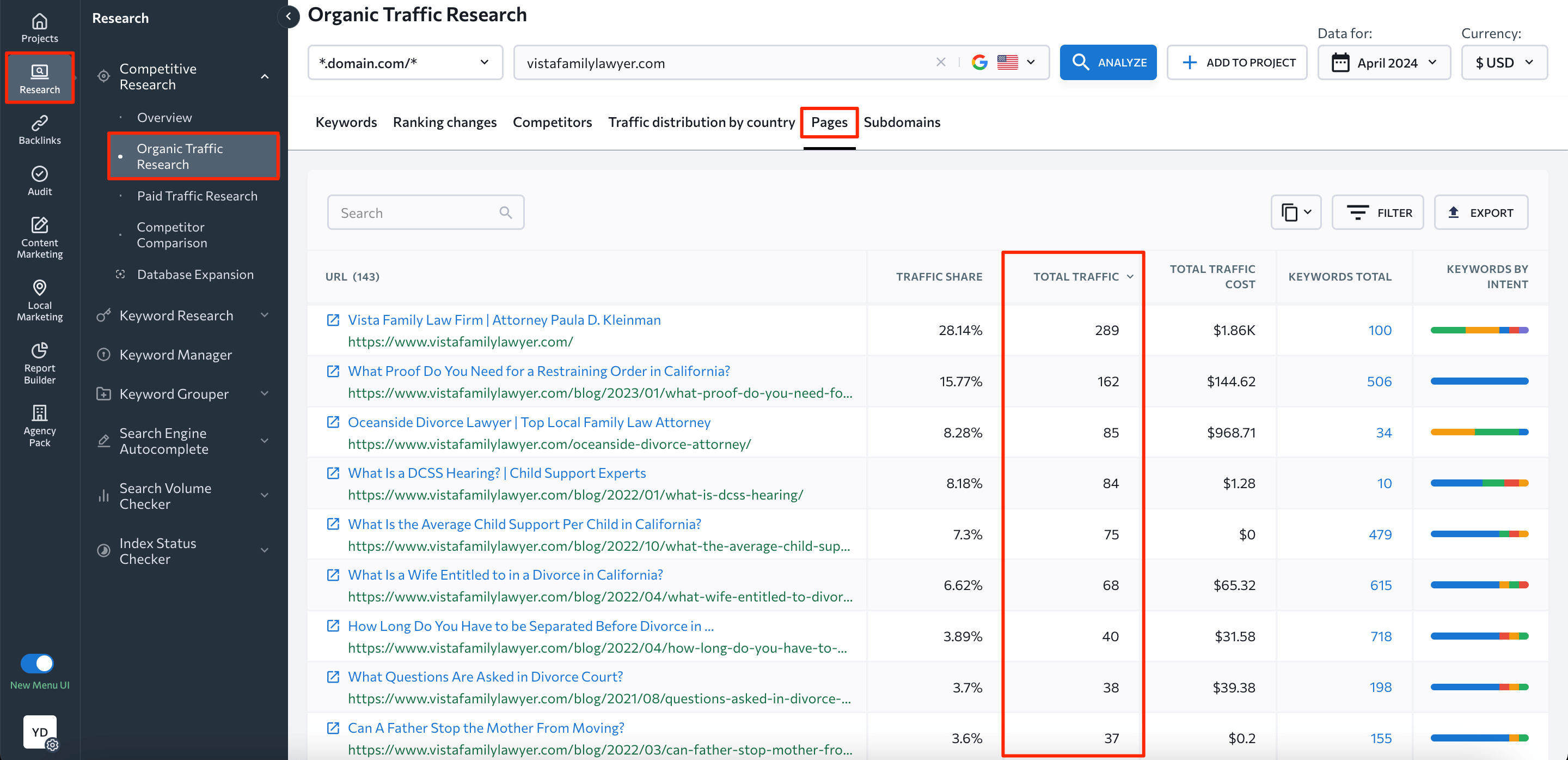

Additionally, this tool shows a list of keywords targeted by your competitors in their content. It also displays their performance metrics.
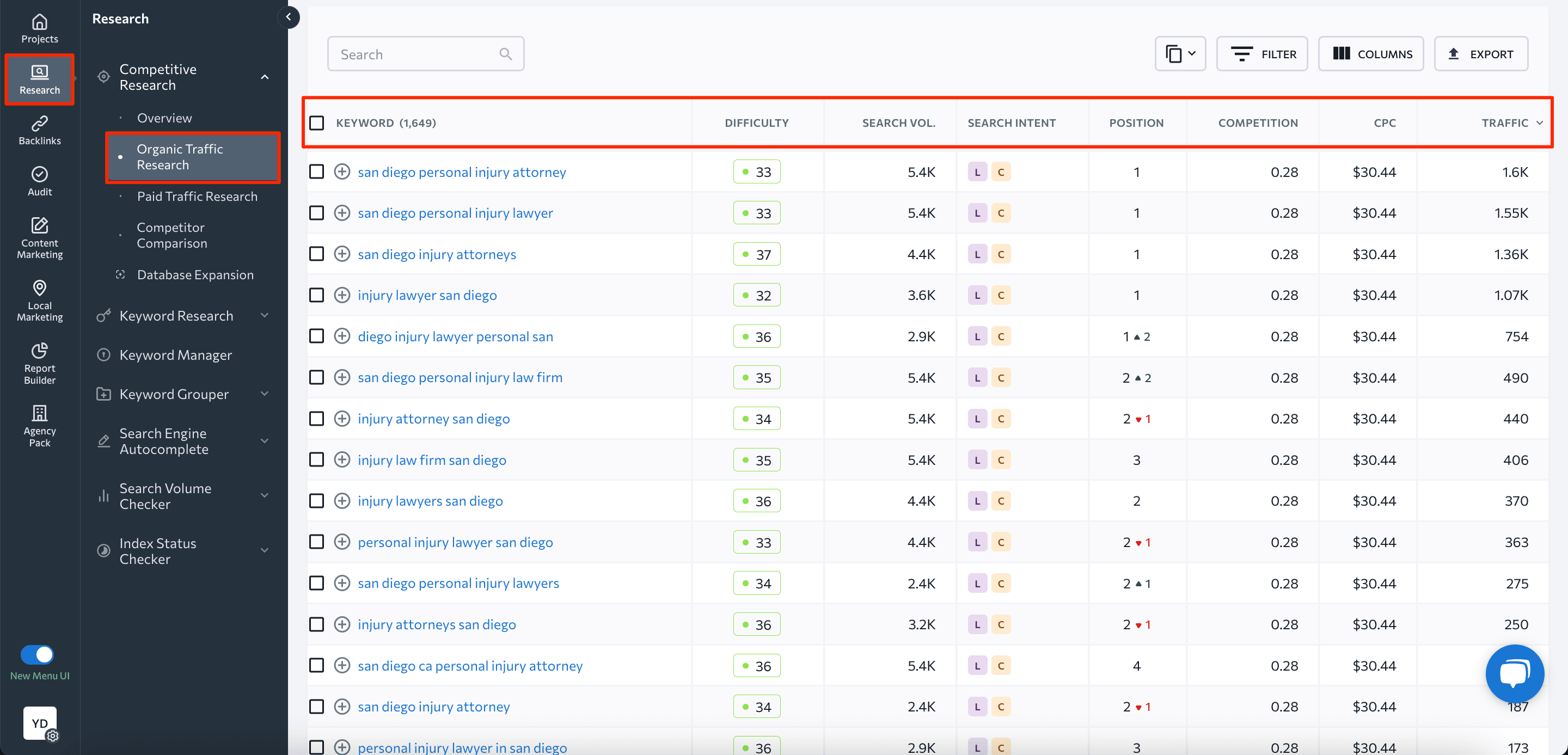

Content and on-page SEO
It’s important to build keyword lists, but keywords are just one piece of the puzzle. To find and connect with your clients, you’ll need to create high-quality content that focuses on bringing value to your readers.
But what kind of content does a law firm need to produce? More importantly, how do you incorporate SEO best practices into your content?
Begin by building a content plan. Map out relevant topics and questions based on your own vision of your legal practice, your client’s common requests, and your keyword research results. This will help you pinpoint and address what your audience is searching for.
Let’s review some content and on-page optimization strategies used by Ben Crump, an American trial lawyer who specializes in civil rights and catastrophic personal injury cases.
1. Practice area pages.
Create dedicated pages for each of your firm’s practice areas (e.g., divorce, personal injury, estate planning, etc.). Optimize the content and main SEO elements (title tags, meta description, headings, URLs) with relevant keywords. These pages should provide a comprehensive overview of the legal services you offer in each area and showcase your expertise and experience.
Ben Crump’s website features a dedicated block called National Practices Areas. Hovering over this tab reveals a drop-down list with content pages for different practice areas like Civil Rights, Hurricane Damage, Medical Malpractice, and Car Accident.
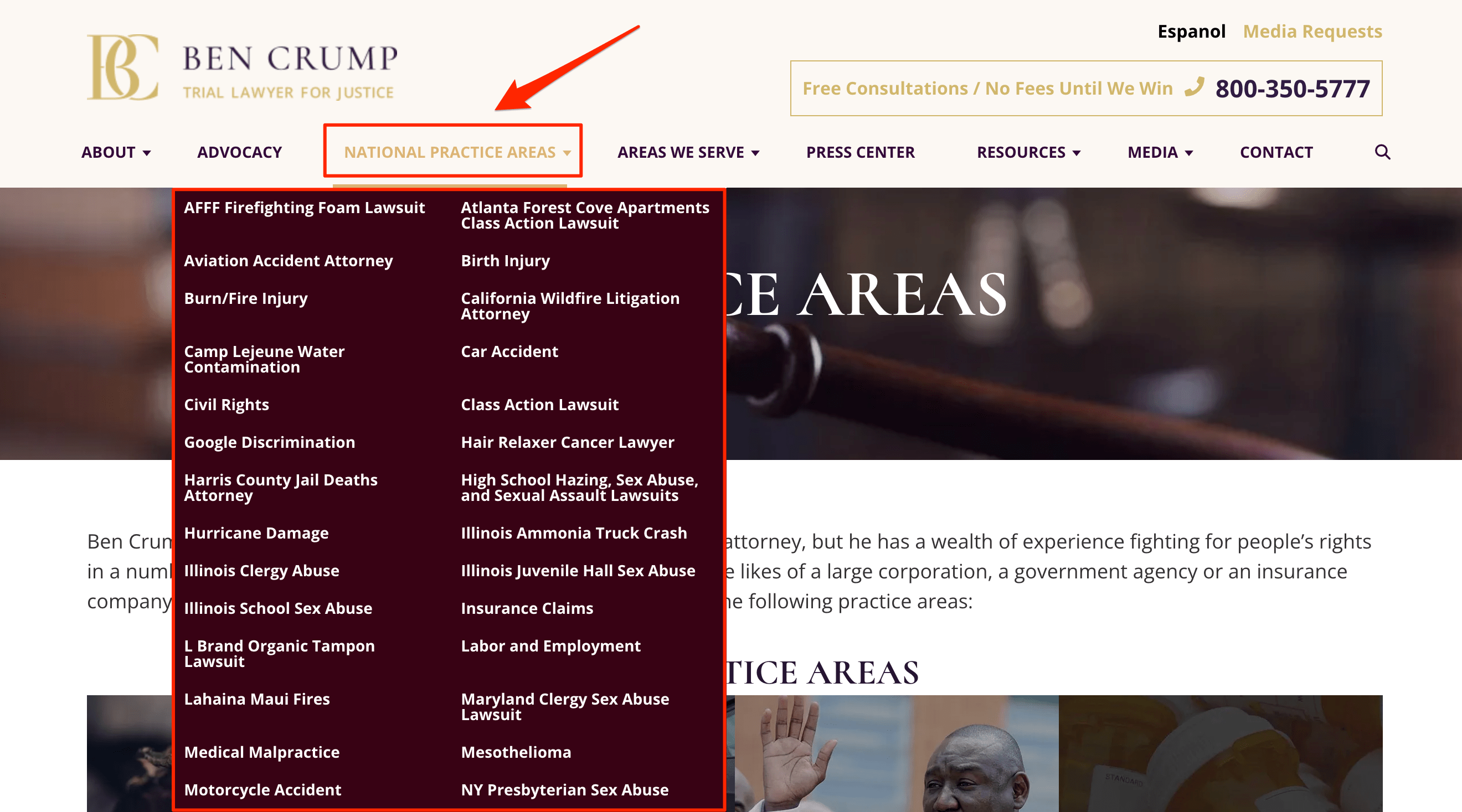

Each of these pages is optimized for a separate law specialization. This makes it easier for Ben Crump to attract clients with specific legal needs. Plus, he can use these pages to target specific audience groups.
As you can see in the screenshot below, pages on this website dedicated to a particular law specialization/location tend to receive a pretty high amount of traffic. Here are its most visited webpages:
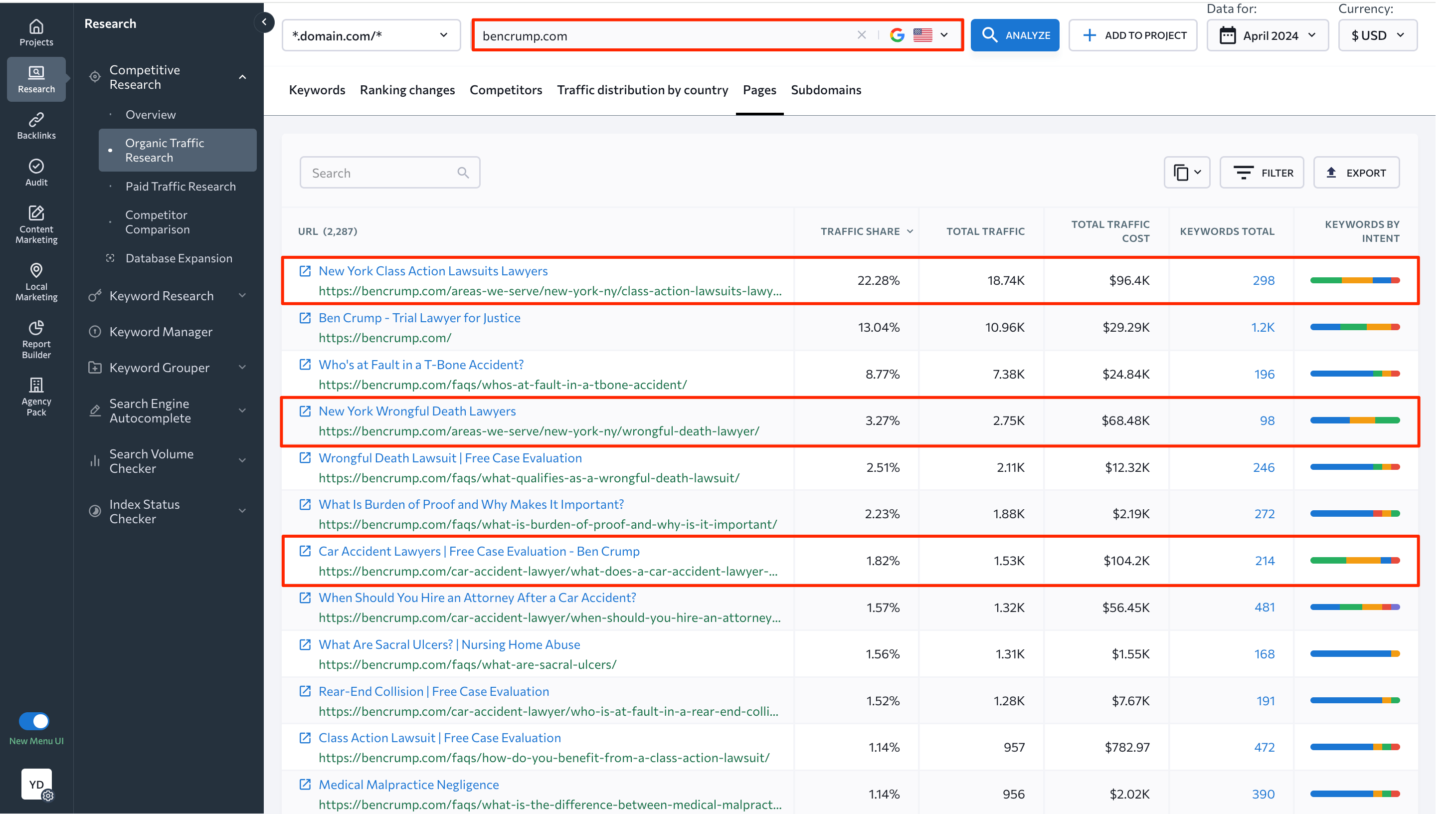

2. Blog and FAQ content.
Another highly recommended content practice for lawyers looking to maximize their SEO is to maintain an SEO-friendly blog with FAQ sections. Firms tend to do this to target informational queries related to the area of law. This practice also validates the professional skills offered by the law specialist or firm. Compared to commercial traffic, usually acquired through main service pages, informational traffic attracted through blog and FAQ content is way easier to get. For example, you could create blog posts and FAQs that cover topics like “What is Parental Alienation?“, “How Much Spousal Maintenance Can I Claim On Divorce?”, “How to File a Personal Injury Claim“, and so on.
Ben Crump’s website features two separate blocks: Blog and FAQ.
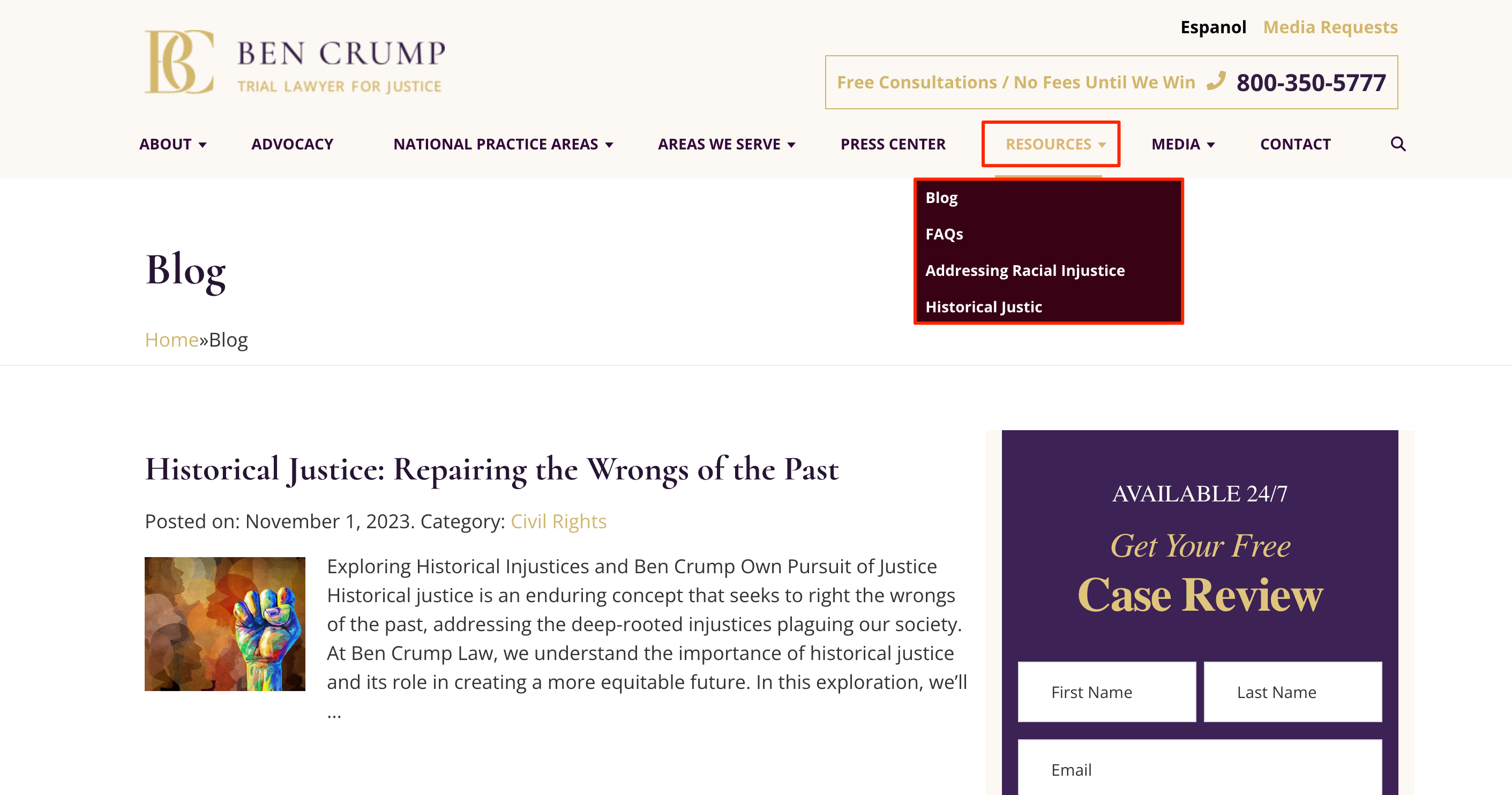

Within the website’s blog, you can find categorized articles on different topics. Here are a few of them:
The FAQ section addresses questions in a variety of categories, including Bicycle Accidents, Nursing Home Abuse, Storm Damage, Worker’s Compensation, and many more.
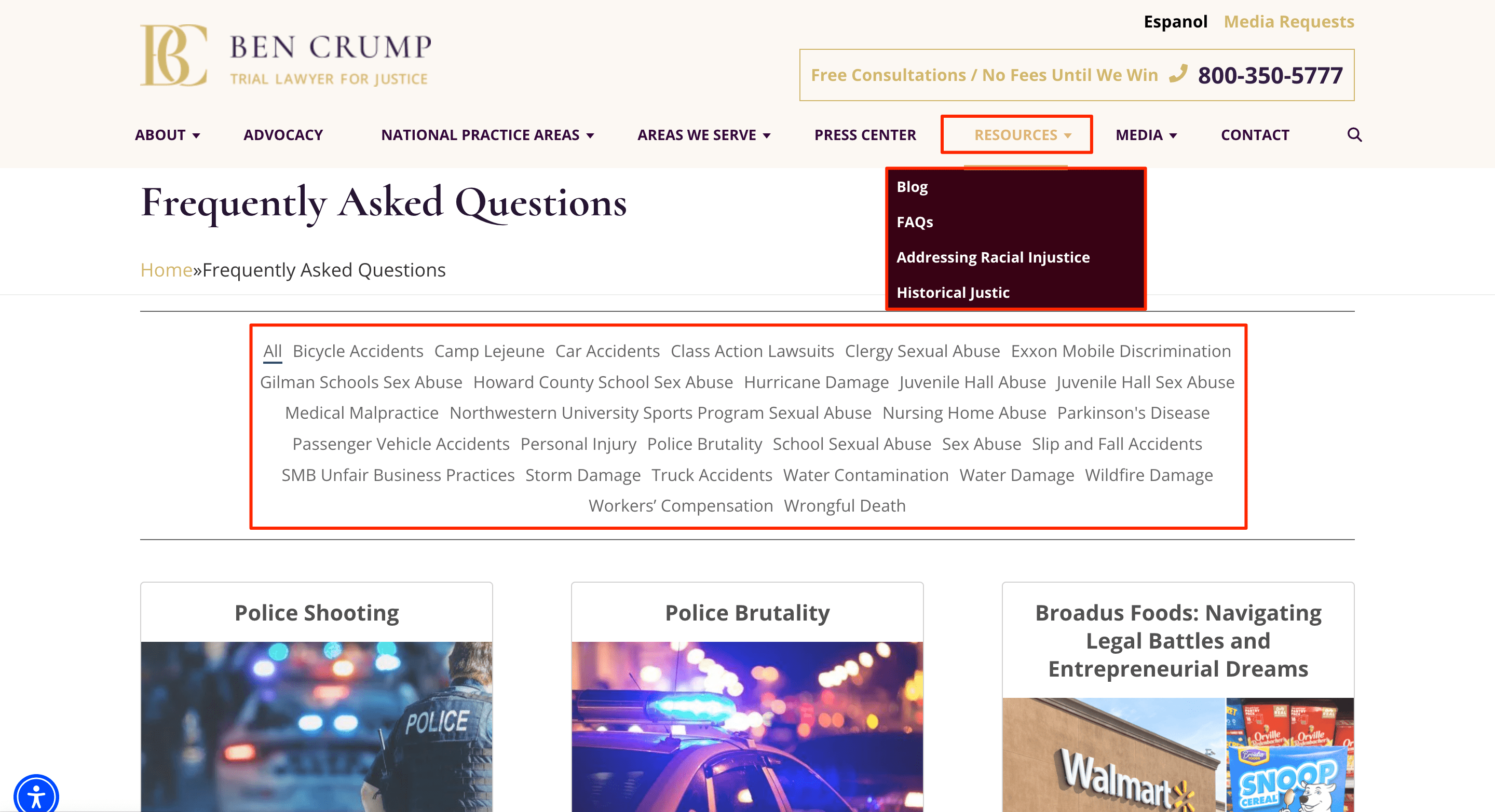

The site’s combination of articles and FAQ answers positions Ben Crump and his team as an authoritative source of legal knowledge. This builds trust and increases the likelihood of visitors becoming clients.
3. Case studies and client success stories.
There’s no better way to demonstrate your firm’s expertise than by presenting successful cases and positive client feedback.
Start by adding positive customer reviews to your homepage and key service pages. Plus, let your results speak for themselves. Create detailed case study pages or blog posts that outline the challenges, strategies, and results of cases you’ve handled as an attorney. For instance, Ben Crump’s law firm website features a dedicated Results page where visitors can learn about the law firm’s achievements.


Scrolling down the page takes you to a compilation of successful cases. Each is carefully selected to demonstrate the favorable results Ben Crump has secured for his clients. These cases are also categorized for better user experience.
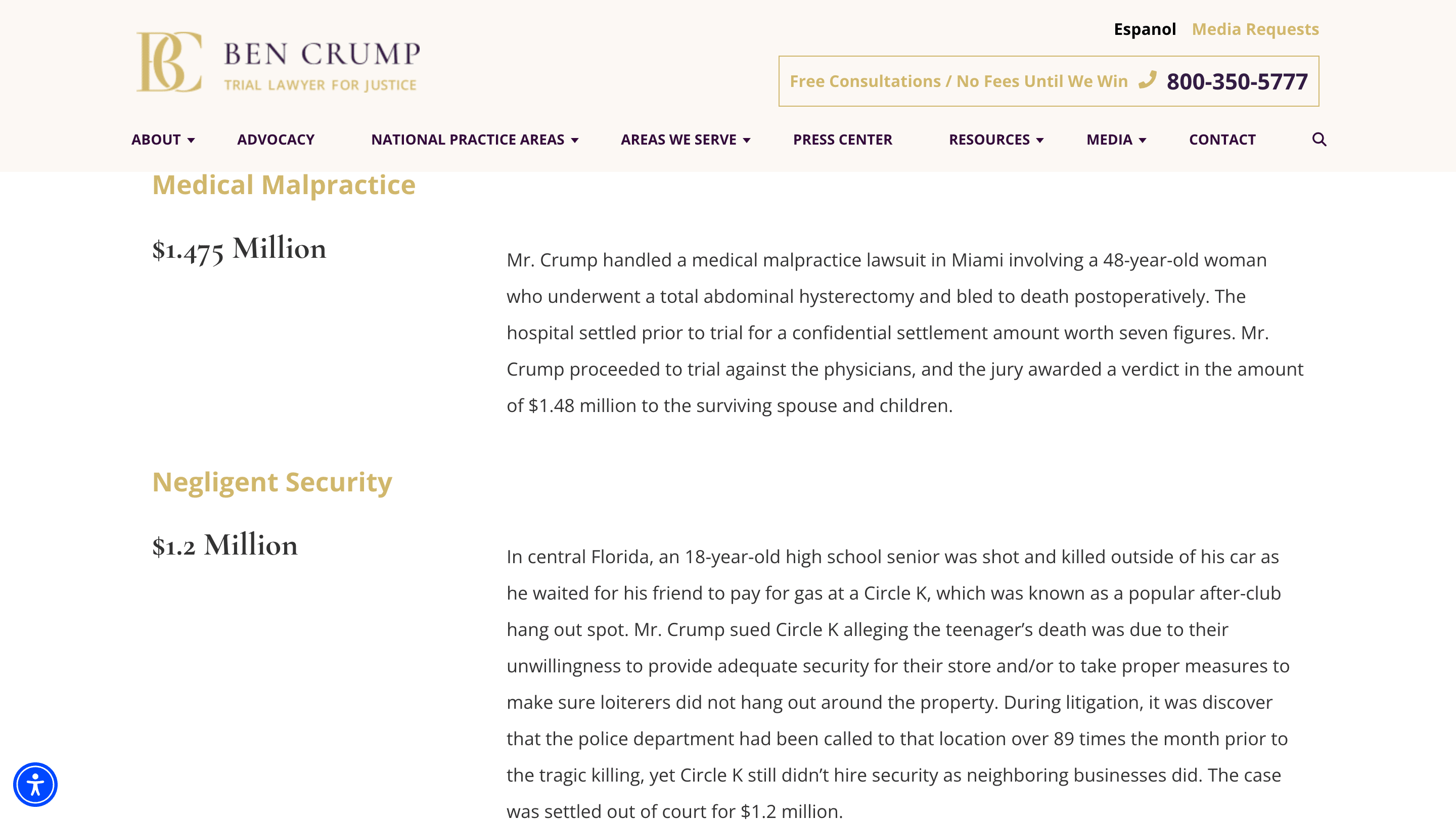

4. E-E-A-T optimization.
As previously mentioned, demonstrating E-E-A-T (Experience, Expertise, Authoritativeness, and Trustworthiness) is crucial for legal SEO success. Clients typically only trust qualified legal professionals to handle major life issues. To align with these expectations, incorporate elements throughout your website that showcase your firm’s credentials, awards, client testimonials, and expertise. Incorporate them into key pages like the homepage, practice area pages, and attorney bios.
For example, Ben Crump’s website features a page dedicated to all attorneys working within the law firm. You can click on any attorney to learn more about their background, education, experience, skills, and so on.
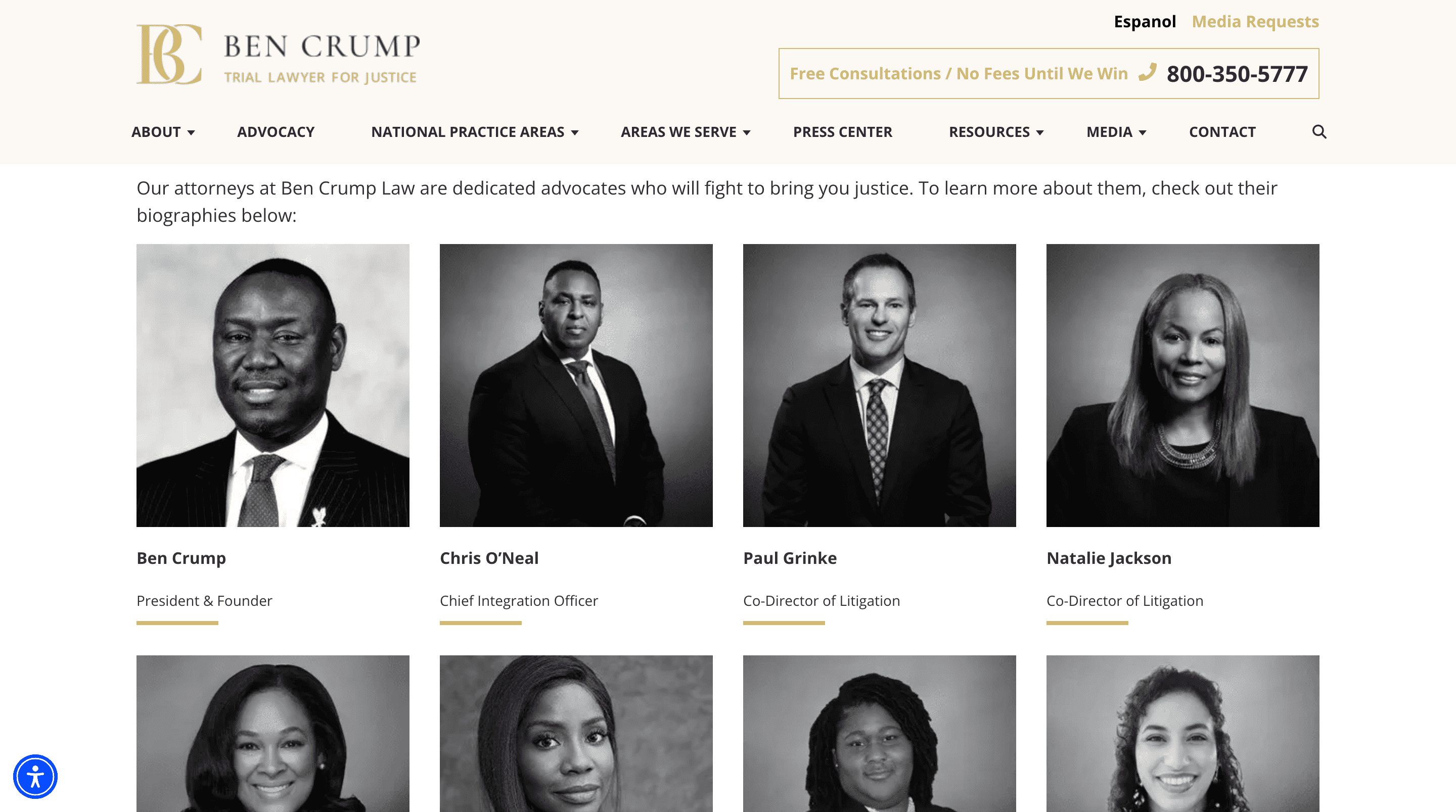

The website’s homepage also includes a separate section related to Ben’s latest national appearances on credible sources, including CNN, NBC News, ABC 7 Chicago, and more.
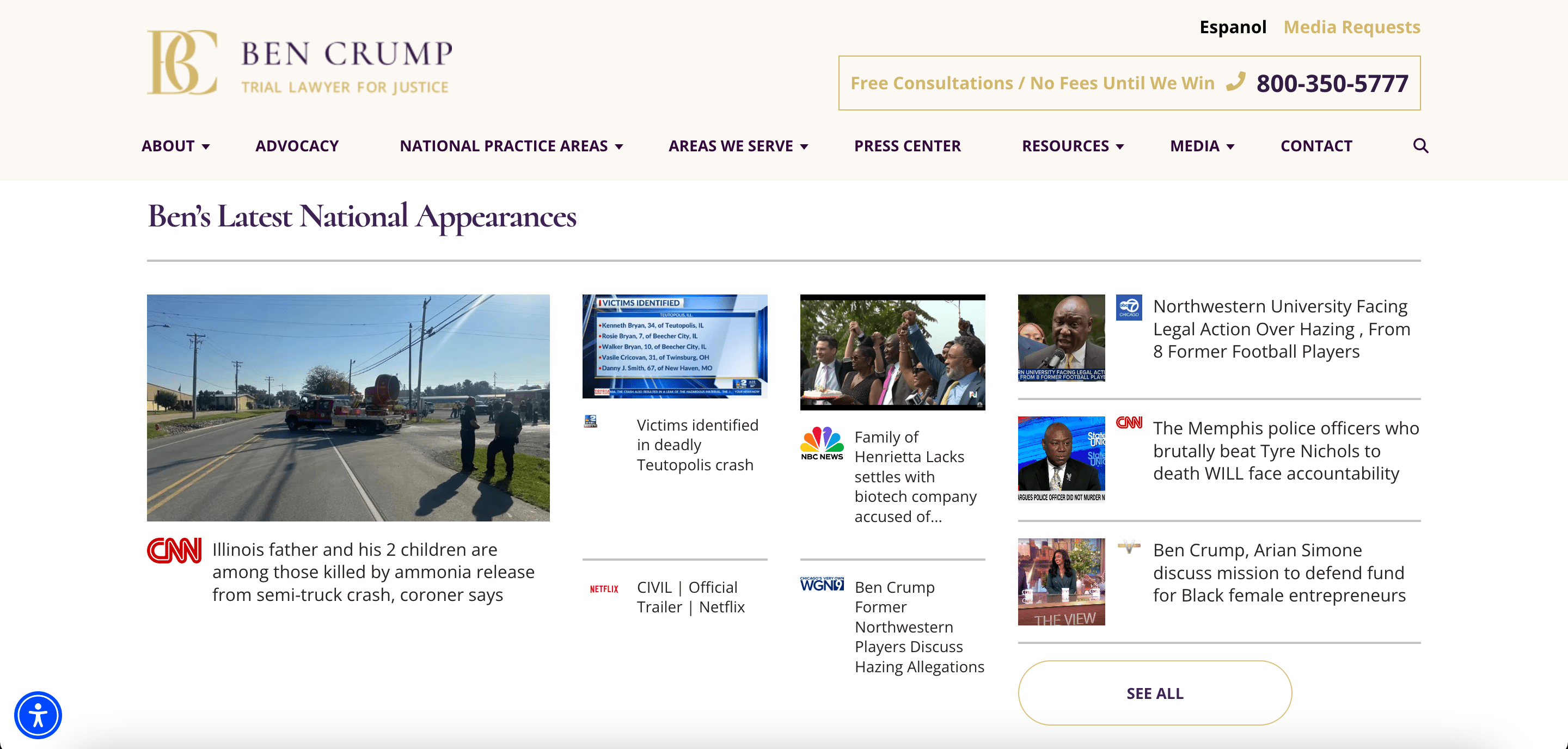

The homepage also displays Ben Crump’s mention in New York Magazine.


Ben’s bio page showcases his memberships, community involvement, and awards. Some of his awards include the NAACP Thurgood Marshall Award, the SCLC Martin Luther King Servant Leader Award, the American Association for Justice Johnnie Cochran Award, and more.
This combination of elements, including the background information of each attorney working for the law firm, successful cases, mentions by credible sources, and awards, boost this website’s perceived authoritativeness to both people and search engines.
Local SEO
Optimizing your online presence for local search increases your chances of ranking higher for location-based queries like “best lawyer (near me|your location)” and attracting more clients within your geographic area.
But how does Google decide which local search results to place at the top of the SERP? According to Google’s official Help page, “local results are based primarily on relevance, distance, and prominence.”
Relevance refers to how well the website or listing matches the user’s search query. This factor is largely based on the business information you provide. For example, a “pet hotel near airport” query favors listings of pet boarding services close to the airport.
Distance relates to the proximity of each potential search result to the location term used in a search. If you search for “book stores” while traveling, Google will prioritize spots near your current location, rather than your home address.
Prominence indicates how well-recognized a business or expert is within a particular niche. For instance, a restaurant with a loyal social media following and positive feedback from food critics is more likely to appear in searches than a similar restaurant with a minimal online presence.
Now, let’s take a look at some key local SEO strategies used to help law firms match their content with Google’s local search principles:
1. Add your contact address to a visible place on the website (footer) & Contact Us/About Us pages. This can increase visitor trust and help them find your contact details.
2. Create and verify your Google Business Profile (GBP) profile. Input accurate information about your firm, including your business name, address, phone number, website, business hours, and so on. Keep your NAP (Name, Address, Phone Number) information consistent across all online listings.
3. List your law firm in relevant local directories and citation sources, such as legal directories and local business listings. For instance, if you’re located in New York, consider the following local directories and citation sources:
- Vault: They publish a “2024 Best Law Firms in New York” list.
- BCG Search: They feature a “Best Corporate Law Firms in New York” section.
4. If relevant to your business, create location-specific pages, blog posts, and other content targeting your local service areas. For instance, consider publishing state/city/neighborhood guides on legal topics or legal updates/news tailored to the specific needs and concerns of your local community.
5. Encourage satisfied clients to leave positive reviews on platforms like GBP, Yelp, and industry-specific legal directories. Even though customer reviews are not a direct ranking factor, they can still help you establish yourself or your firm as a reputable industry player and enhance your local search visibility.
To evaluate your local presence, tools like SE Ranking’s Local Marketing Tool can help. This tool, in particular, allows you to track your rankings across different locations, monitor listings in business directories, manage customer reviews directly from the platform, and evaluate the consistency and accuracy of a location’s NAP data. This tool also provides a comprehensive report that displays the biggest local search-related performance issues. It also offers quick-fix tips for your profile, business listings, and reviews. All tips are categorized by priority level.
Technical SEO & accessibility
Before discussing how to implement technical SEO practices for lawyers, let’s first clarify what technical SEO is.
Technical SEO is the process of optimizing your website so that search engines like Google can easily find, crawl, understand, and index your pages. It combines all the background work that gets your website noticed by search engines and causes it to rank higher on SERPs.
However, when optimizing your website, you should think beyond rankings. Positive UX and high user accessibility should always be your top priority. To be accessible, websites should meet the following four principles, known as POUR:
- Perceivable (e.g., the site uses a considerable color contrast ratio between text and background to improve readability for users with visual impairments).
- Operable (e.g., timeouts for actions aren’t too short, enabling users with cognitive disabilities to complete tasks at their own pace).
- Understandable (e.g., menus and functionalities are placed in the same location, maintaining predictable behavior across the website).
- Robust (e.g., the website functions properly on assistive technologies like screen readers and screen magnifiers).
For accessibility audits, start by analyzing the navigation and footer features. Check if all elements in these blocks are fully accessible to all users. In addition, focus on using only meaningful links with easy-to-understand anchor texts so that users can clearly understand where they’ll be directed when they click.
When incorporating legal information, check its readability on the webpage (avoid using tiny fonts for copyright or legal information). Also, all form fields, especially the search box, should have clear and informative labels. Finally, make sure all images, including icons, have clear and concise alternative text (alt text) descriptions.
To optimize your law firm’s website for technical SEO, implement the technical SEO best practices below:
1. Regularly perform website audits to identify and fix technical issues that can lessen your performance.
For instance, you could establish a weekly or bi-weekly quick audit routine to catch minor issues early. Conduct more comprehensive website analyses once per quarter.
Here are some of the most critical issues that you may encounter during the website audit (these should be fixed first):
- Crawling and indexability issues: Audit your website for these issues to ensure your webpages are eligible for indexing and can be displayed in SERPs. Make sure your URLs are not blocked by robots.txt and noindex tags. These URLs should also have correct canonical tag settings (i.e., the main version). Finally, make sure all pages have internal links to them.
- Duplicate content issues: This occurs when at least two pages with identical or pretty similar content appear on the web. Some common instances leading to these problems include creating very similar blog posts or other pages around the same keywords. Monitor your website for these issues and address them immediately to avoid confusing search engines and potentially harming your website’s rankings.
- Broken links and images (4XX HTTP status code), redirect issues (3ХХ HTTP status code), and server errors (5ХХ HTTP status code): These can severely hurt SEO and user experience. In fact, a 5xx response means users and Google can’t access your website. Redirect issues can cause visitors to loop endlessly or land on irrelevant pages. Broken links and images also create a frustrating user experience, confuse search engine crawlers, and waste valuable linking power that would otherwise contribute to your website’s authority. So, if you’ve detected any of these issues during the website audit, fix them as early as possible.
- Core Web Vitals and page speed issues: These issues directly impact both UX and rankings. Combat them by performing optimization activities, such as moving to a faster server, compressing images, enabling browser caching, optimizing CSS and JavaScript files, and so on.
2. Recent data shows that the average web page load time is 2.5 seconds on desktop devices. If your website loads at least several seconds longer, don’t expect users to stay and keep waiting. They have probably already moved on to other websites.
To evaluate your website’s page speed, tools like PageSpeed Insights or SE Ranking’s Free Website Speed Test can help. Both tools check page loading speed for desktop and mobile versions.
Always check mobile and desktop speed performance separately, as layouts and designs differ greatly between big and small screens. This also directly impacts load speed. Mobile connection can also vary across geo-locations. This means your website speed performance on desktop and mobile might show different results. Another thing to keep in mind is that Google takes a mobile-first indexing approach. In other words, Google prioritizes mobile versions of your pages for indexing and ranking. Since website speed is a confirmed ranking factor, you should include it in your SEO checklist.
3. Test your website on different devices and screen sizes to ensure all content and elements, such as buttons and forms, are visible and clickable. Frustrated users who can’t click buttons or see content won’t stick around.
4. Continuously track your website health, especially after implementing changes based on website audit findings.
Keep in mind that conducting a technical SEO audit manually can be a resource-intensive and time-consuming process. To streamline audits, most SEOs use a combination of specialized site crawlers, like SE Ranking’s Website Audit and Google Search Console.
These tools can help you identify and fix the following kinds of technical SEO issues:
Alternatively, here’s a comprehensive list of the best SEO audit tools. Explore it to find the perfect solution for your needs and budget.
Off-page SEO
Off-page, in this context, refers to a set of activities performed beyond your website to enhance its rankings.
Off-page SEO involves building a website’s credibility and relevance beyond your domain. This is why it’s essential to focus on backlinks, which are a key measure of website authority.
Backlinks are considered votes of confidence. When websites link to you, this indicates to Google that your content is valuable, credible, and useful. If your website constantly receives backlinks from high-quality domains and, therefore, becomes more authoritative, it is more likely to rank higher. Getting mentions and backlinks also promotes brand exposure and referral traffic.
Now, let’s look closely at some effective off-page tactics for law firms.
Digital PR campaigns
Having a successful digital PR strategy helps you build brand awareness, increase online visibility, build relevant backlinks, and establish yourself or your law firm as an authoritative source that people can rely on.
To get the most out of your digital PR strategy, consider the following:
- Identify a list of successful cases: Showcase your professional skills and expertise as a lawyer here. Create attention-grabbing narratives around these cases and incorporate your brand into these materials.
- Pitch these content pieces to relevant media. This could include blogs and industry influencers. Personalize your pitches, as many experts/companies still send templated pitches without addressing the recipient by name, often using a random email address. Plus, keep your PR pitches short, engaging, and timely for the topic.
HARO backlinks
To stand out as a skilled lawyer with an impactful professional background, share your experience through expert quotes or commentary. These quotes could relate to industry trends, legal developments, or newsworthy events.
Don’t hesitate to reach out to journalists, bloggers, and online publications seeking expert opinions. You can also use platforms like HARO to increase your brand awareness and secure valuable backlinks to your website.
Guest blogging
Guest blogging is the technique of publishing your articles on other websites. It’s a straightforward process: create a list of content topics for which to share your expertise, create a list of targeted websites, reach out to them, negotiate collaboration, and provide them with a ready-to-publish content piece. Within your text, include relevant backlinks to your website and establish yourself as an expert in the field.
But why bother with guest blogging? Well, it’s a marketing technique that allows you to:
- Build your personal brand.
- Acquire relevant backlinks to your site.
- Grow your audience on social media channels.
- Build relationships with other influencers in your field.
- Drive referral traffic.
- Boost brand awareness.
- Get more leads and customers.
Social media marketing
Active engagement on social platforms can be a powerful tool for establishing yourself or your business as a thought leader in your niche. It brings leads directly to your social media accounts or website and indirectly contributes to SEO (by increasing brand visibility and exposure).
More specifically, you can use social media channels like LinkedIn, Facebook, or X to provide commentary, analysis insights, or expert opinions. If you continually share valuable content, you are more likely to receive social shares. When someone shares your content, this can snowball and help you reach a larger audience. Other websites will be more likely to link back to your article, further boosting your credibility.
Industry publications may also reach out to you for your insights as you rise in popularity. Collaborate with them by contributing guest posts, participating in interviews, and co-creating content that aligns with their audience’s interests.
Strategies to implement SEO for lawyers
Now that you know the fundamentals of attorney SEO, your next step is to figure out how to implement them.
There are two viable methods: implementing SEO yourself or hiring a law firm SEO expert. Both options come with their pros and cons. Let’s go through each of them to discover which approach fits your needs best.
Option #1: Hire a law firm SEO expert
The simplest and most common approach to performing lawyer SEO is to enlist a marketing agency that specializes in SEO for law firms. To simplify the process of searching for the most experienced lawyer SEO experts, we’ve compiled a list of the best SEO agencies.
You can filter this agency catalog by location, industry, team size, language, and SEO services. For instance, you could specify Legal in the Industry column and US in the Locations column. This will reveal a list of agencies in the US that offer SEO services for your niche.
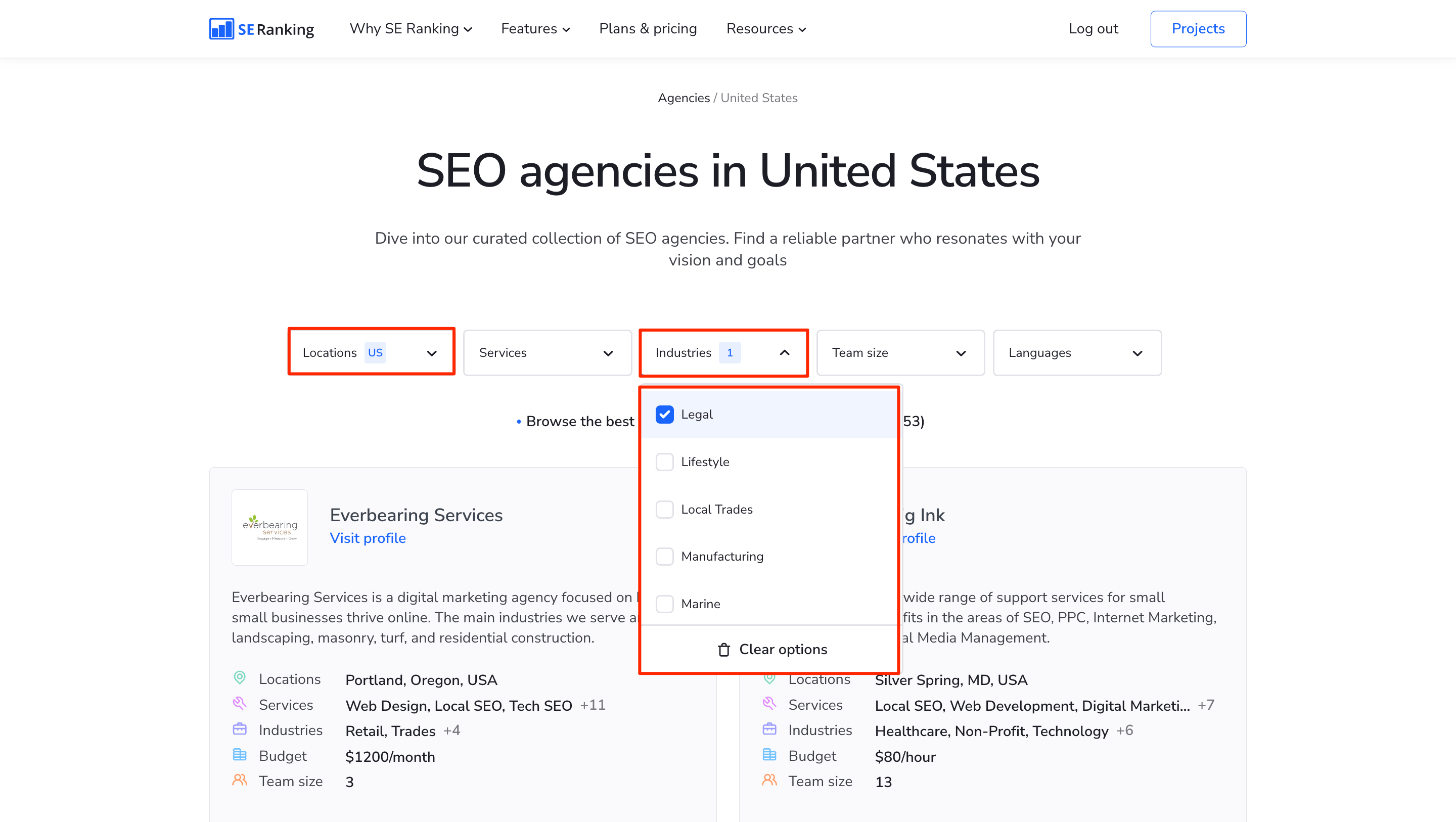

After looking at the agency’s general information, explore their profile further. Look for detailed information, client testimonials, and visit their website to learn about their history, case studies, SEO methodology, pricing, and so on. You can also contact any agency directly from our catalog.
Our catalog simplifies the process of finding experts with hands-on experience in lawyer SEO services. This saves you valuable time.
Option #2: Do SEO yourself
Optimizing your lawyer website’s SEO can be a complex and time-consuming process, especially if you don’t have prior SEO experience. While it’s possible to perform the entire SEO cycle yourself, this probably isn’t the most effective use of your resources as a lawyer.
Instead, consider hiring an in-house SEO specialist. Having someone on your team with knowledge and expertise in SEO can boost your presence in relevant SERPs.
If you’re still determined to handle SEO yourself, proceed with caution. Start by finding a dedicated SEO software. Use the data it collects to perform all the SEO processes mentioned in this article.
For instance, by using a comprehensive SEO platform like SE Ranking, you can get access to reliable datasets and insights to help you perform all major SEO tasks effectively.
- Need to perform in-depth keyword research and find untapped keyword opportunities? Keyword Research Tool is here to help you.
- Looking for insights on competitors’ organic strategies (e.g., top-performing pages or target keywords)? Use Competitive Research Tool.
- Need to analyze your website’s technical SEO health and identify issues affecting its performance? Website Audit is your top choice.
- Want to track keyword rankings across major search engines like Google, Bing, Yahoo, and even YouTube? Rank Tracker is at your disposal.
- Searching for a tool that can single-handedly track business rankings in local search, monitor listings in different business directories, and manage your location data across GBP accounts? Local Marketing Tool is your go-to solution.
The SE Ranking platform delivers unique data insights at a fair price, which is essential for building and implementing effective SEO strategies and maximizing your SEO ROI.
But to achieve the best results, you’ll need to learn more about SEO by taking an SEO course or going through additional tutorials within each subtopic.
Conclusion
As you can see, optimizing your law firm’s website is a complex process. Getting started can be overwhelming, but it’s achievable with a step-by-step plan.
Maybe you’ve decided to improve your firm’s SEO on your own. Or, maybe this article inspired you to get help from a seasoned SEO expert. Either way, we hope you now have a clear understanding of what lawyer SEO is, why it matters, and how to implement an effective SEO strategy tailored to your needs.
منبع: https://seranking.com/blog/seo-for-lawyers/
